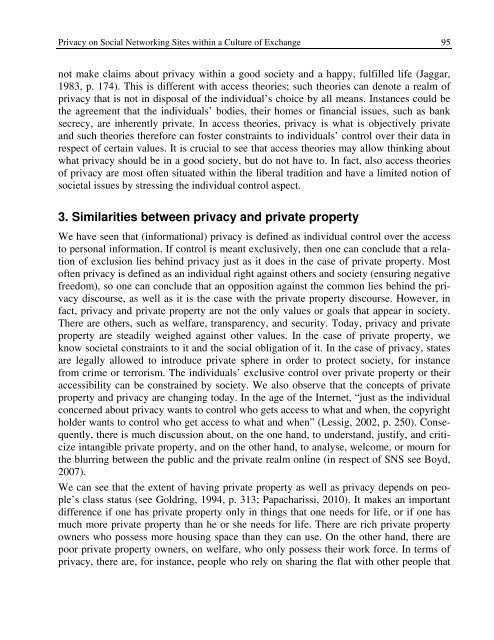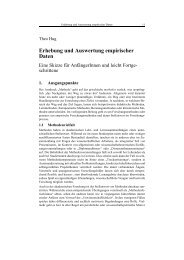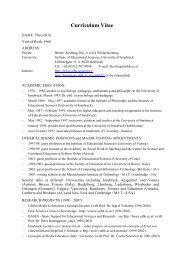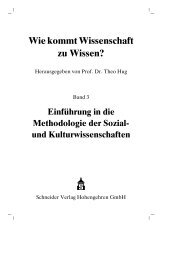Cultures and Ethics of Sharing - Universität Innsbruck
Cultures and Ethics of Sharing - Universität Innsbruck
Cultures and Ethics of Sharing - Universität Innsbruck
- Keine Tags gefunden...
Sie wollen auch ein ePaper? Erhöhen Sie die Reichweite Ihrer Titel.
YUMPU macht aus Druck-PDFs automatisch weboptimierte ePaper, die Google liebt.
Privacy on Social Networking Sites within a Culture <strong>of</strong> Exchange 95not make claims about privacy within a good society <strong>and</strong> a happy, fulfilled life (Jaggar,1983, p. 174). This is different with access theories; such theories can denote a realm <strong>of</strong>privacy that is not in disposal <strong>of</strong> the individual’s choice by all means. Instances could bethe agreement that the individuals’ bodies, their homes or financial issues, such as banksecrecy, are inherently private. In access theories, privacy is what is objectively private<strong>and</strong> such theories therefore can foster constraints to individuals’ control over their data inrespect <strong>of</strong> certain values. It is crucial to see that access theories may allow thinking aboutwhat privacy should be in a good society, but do not have to. In fact, also access theories<strong>of</strong> privacy are most <strong>of</strong>ten situated within the liberal tradition <strong>and</strong> have a limited notion <strong>of</strong>societal issues by stressing the individual control aspect.3. Similarities between privacy <strong>and</strong> private propertyWe have seen that (informational) privacy is defined as individual control over the accessto personal information. If control is meant exclusively, then one can conclude that a relation<strong>of</strong> exclusion lies behind privacy just as it does in the case <strong>of</strong> private property. Most<strong>of</strong>ten privacy is defined as an individual right against others <strong>and</strong> society (ensuring negativefreedom), so one can conclude that an opposition against the common lies behind the privacydiscourse, as well as it is the case with the private property discourse. However, infact, privacy <strong>and</strong> private property are not the only values or goals that appear in society.There are others, such as welfare, transparency, <strong>and</strong> security. Today, privacy <strong>and</strong> privateproperty are steadily weighed against other values. In the case <strong>of</strong> private property, weknow societal constraints to it <strong>and</strong> the social obligation <strong>of</strong> it. In the case <strong>of</strong> privacy, statesare legally allowed to introduce private sphere in order to protect society, for instancefrom crime or terrorism. The individuals’ exclusive control over private property or theiraccessibility can be constrained by society. We also observe that the concepts <strong>of</strong> privateproperty <strong>and</strong> privacy are changing today. In the age <strong>of</strong> the Internet, “just as the individualconcerned about privacy wants to control who gets access to what <strong>and</strong> when, the copyrightholder wants to control who get access to what <strong>and</strong> when” (Lessig, 2002, p. 250). Consequently,there is much discussion about, on the one h<strong>and</strong>, to underst<strong>and</strong>, justify, <strong>and</strong> criticizeintangible private property, <strong>and</strong> on the other h<strong>and</strong>, to analyse, welcome, or mourn forthe blurring between the public <strong>and</strong> the private realm online (in respect <strong>of</strong> SNS see Boyd,2007).We can see that the extent <strong>of</strong> having private property as well as privacy depends on people’sclass status (see Goldring, 1994, p. 313; Papacharissi, 2010). It makes an importantdifference if one has private property only in things that one needs for life, or if one hasmuch more private property than he or she needs for life. There are rich private propertyowners who possess more housing space than they can use. On the other h<strong>and</strong>, there arepoor private property owners, on welfare, who only possess their work force. In terms <strong>of</strong>privacy, there are, for instance, people who rely on sharing the flat with other people that








